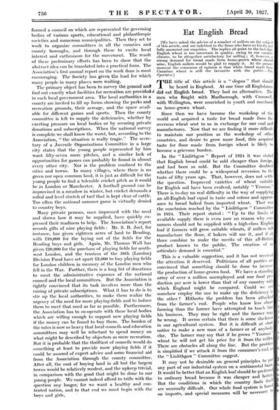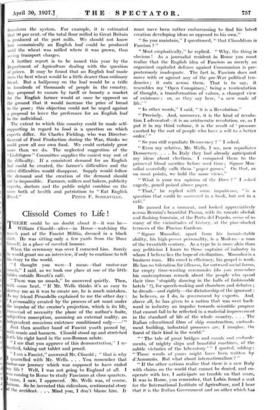Eat English Bread
[We have asked the advice of a number of millers on the iiubject of this article, and are indebted to the firms who have so kindly an fully answered our enquiries. The replies all point to the fact that English wheat is too uncertain in quality, owing to our variable climate, to be altogether satisfactory for milling ; if, however, a strong demand for bread made from home-grown wheat should arise, English millers would be glad to supply it. At the present moment the consensus of opinion is that white bread made from Canadian wheat is still the favourite with the public.—Ey,
Spectator.] •
THE title of this article is a " slogan" that should be heard in England. At one time all Englishmen did eat English bread. They had no alternative. The men who fought with Marlborough, with Cromwell, with Wellington, were nourished in youth and manhood on home-grown wheat.
Since then we have become the workshop of the world and acquired a taste for bread made from the overseas wheat sent to us in exchange for our coal and manufactures. Now that we are finding it more difficult to maintain our position as the workshop of other countries, and desire to grow more food, this acquired taste for flour made from foreign wheat is likely to become a grievous burden.
In the " Linlithgow " Report of 1924 it was stated that English bread could be sold cheaper than foreign, and had been so sold. But the Committee doubted whether there could be a widespread reversion to the taste of fifty years ago. That, however, does not settle the question; Improved varieties of wheat suitable for English soil have been evolved, notably "Yeoman. There is to-day no real difficulty in the way of supplying an all-English loaf equal in taste and colour and appear- ance to bread baked from imported wheat. That was the conclusion reached by the " Linlithgow " Committee in 1924. Their report stated : "Up to the limits of available supply there is even now no reason why con- sumers should not be supplied with a high-class English loaf if farmers will grow suitable wheats, if millers will manufacture the flour, if bakers will use it, and if all three combine to make the merits of this all-British product known to the public. The creation of an articulate demand is essential."
This is a valuable suggestion, and it has not received the attention it deserved. Politicians of all parties are convinced that something should be done to inerea, the production of home-grown food. We have a standii: army of over a million unemployed and our food pp - duction per acre is lower than that of any country wit which England might be compared. Could we somehow employ the one to make up the deficiency the other ? Hitherto the problem has been attacku! from the - farmer's end. People who know less about farming than the farmer have attempted to teach him his business. . They may be right and the farmer may be wrong. It seems certain that there is some slackness in our agricultural system. But it is difficult at short notice to make a new man of a farmer or of anybod.): else. The farmer may say that if he -grows "Yeoman wheat he will not get his price for it from the miller. There are obstacles all along the line. But. the problem is simplified if we attack it from the consumer's end, a, the " Linlithgow " Committee suggest.
It may not be desirable on general principles to pl any part of our industrial system on a sentimental basis. It would be better that an English loaf should be preferred to ordinary bread because it was cheaper and better: But the conditions in which the country finds it-0 are unusually difficult. Our whole food system is based on imports, -and special measures will be • necessary t° transform the system. For example, it is estimated that 90 per cent. of the total flour milled in Great Britain is produced at the port mills. We should not know how economically an English loaf could be produced until the wheat was milled where it was grown, thus saving transport charges.
A further report is to be issued this year by the Department of Agriculture dealing with the question of prices. It may be found that an English loaf made from the best wheat would be a little dearer than ordinary bread. But a halfpenny on the loaf would be a trifle to hundreds of thousands of people in the country. Any proposal to ensure by tariff or •bounty a market for the English farmer would at once be opposed on the ground that it would increase the price of bread to the poor; this objection could not be urged against a proposal to leave the preference for an English loaf to the individual. . .
The extent to. which this country could be made self, supporting in regard to food is 'a question on which experts differ. Sir. Charles Fielding, who was Director- General of Food Production during the War, thinks we could grow- all our own food. We could certainly grow more than we do. The neglected suggestion of the 'Linlithgow" Committee- supplies the easiest way out of the difficulty. If a consistent demand for an English loaf could be created, the farmer's difficulties and the other difficulties would disappear. Supply would follow the demand- and the creation of the demand should not be impossible. Farmers, millers and bakers, publicity experts, doctors and the public might combine on the score both of health and patriotism to "Eat English











































 Previous page
Previous page